Dnd 5e Are You Supposed to Know the Save
What is D&D 5E? The basics of races, classes, and dice explained
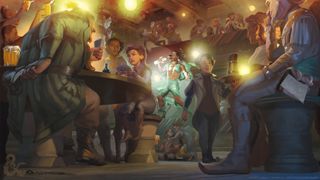
Dungeons and Dragons, or D&D, has grown from a complicated game played in musty basements to a worldwide phenomenon. Thanks to shows like Stranger Things and Big Bang Theory, the world of D&D has been introduced to more people than ever before – while the rise of podcasts and web serial like Critical Office and Acquisitions Incorporated, where people play D&D online for everyone to watch, the latest 5th Edition of the game (known every bit '5E') has attracted a wider audience far beyond your typical nerds.
D&D is all about imagination. It's a system that allows you and your friends to tell a story together, and it can be whatsoever story you want it to exist. Every bit someone who'south been playing for years, I often have friends and family ask me to explicate what this strange fantasy game is all virtually – and why I'thou and then addicted to buying new dice.
Only, every time I try and tell them of the fantastical stories I've been a part of – defeating an aboriginal blue dragon with the assist of the Rex of the Giants or traveling to the Feywild to stop the spread of a foreign disease that been plaguing the forest – their eyes glaze over and they nod forth politely. Considering these stories and every D&D story happens within the minds of the people sitting at the table – and, to an outsider, it all just seems a bit strange.
To go the existent experience, you need to grab a character sheet and some dice, and try out the game first-hand. That's where we come in: this guide to D&D races, classes and dice will run you through the most important points to continue in mind, with an explanation of how the underlying game mechanics work.
- How to play D&D online – and actually have fun
Playing the game
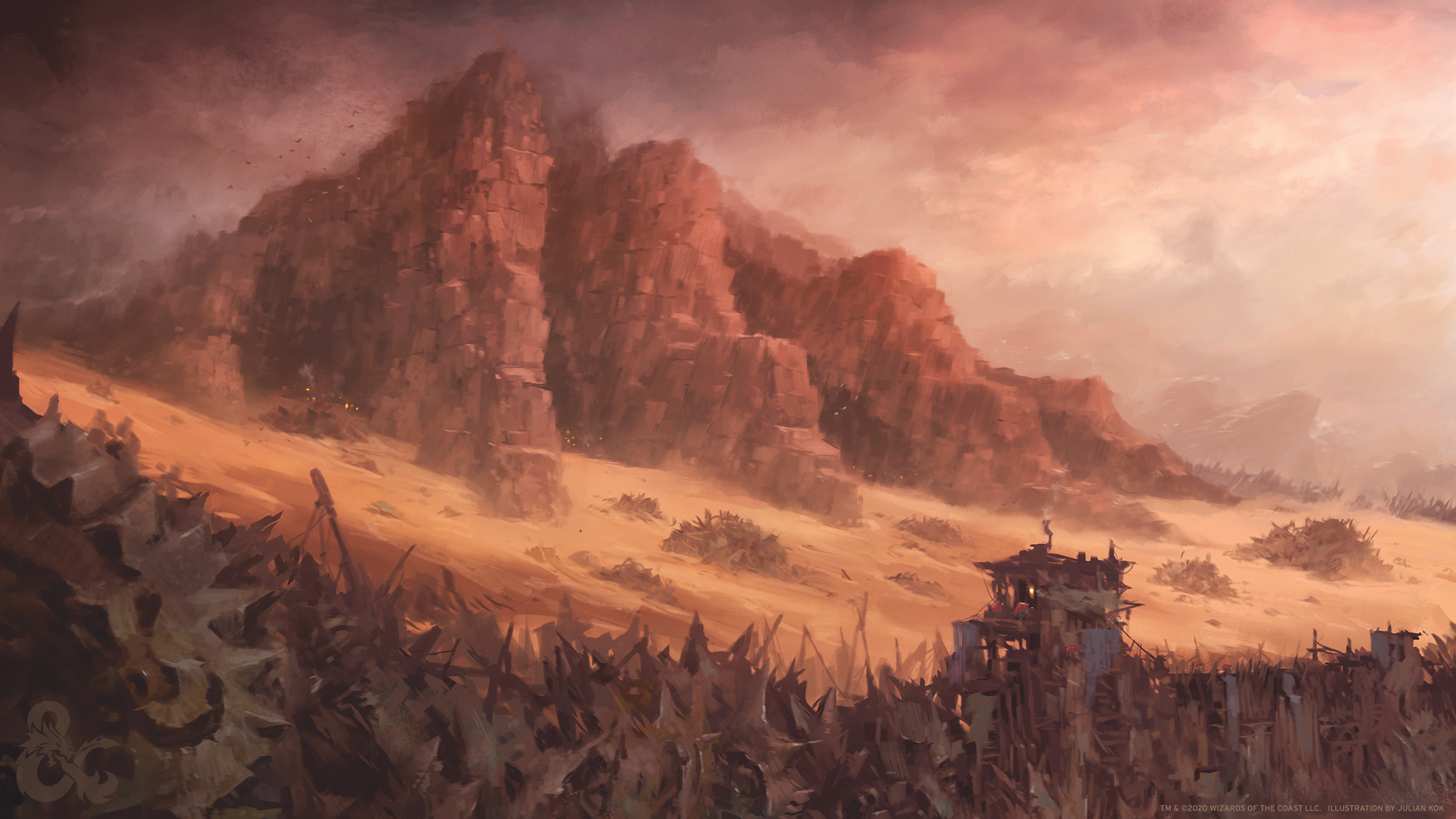
Permit's suspension down the game into something easy to understand for beginners. There are iii main aspects to a game of D&D: combat, exploration, and roleplay. Unlike games will feature different balances of these depending on how the people like to play.
Combat
Throughout the game, you lot'll come upward confronting monsters, bandits, and bad guys, and sometimes talking merely won't prepare it. You'll have to defeat them in combat. This is when the Fighters volition dart forward, sword and shield in hand, the Wizards will throw out magic spells from a altitude, and the Clerics will exist on mitt to continue you all healed and live. Combat in D&D is plough-based, so everyone volition have their chance to brand a move, led past the Dungeon Principal that runs the session.
Exploration
Every D&D game is set in a different world. Yous may exist playing a game in one of the 'official' D&D worlds, or your game might be set somewhere your DM has invented themselves. Either way, there is plenty for y'all to go and explore, from sunken ships and haunted castles to deserted villages and monster-ridden mountaintops.
Roleplay
In D&D, yous play every bit a fantasy character. Roleplay is when your grapheme interacts with others in the world. There are dissimilar means to roleplay, then don't be put off if this sounds daunting! Yous can go all-in with an accent or different voice, speaking equally if you were the character. Or, you can describe what your character does: "Ulfgar goes upward to the barmaid and orders drinks for the party".
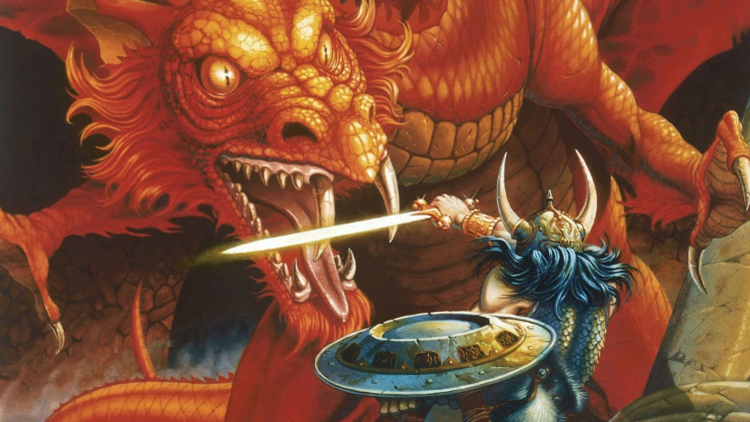
D&D races: elves, humans, halflings, and more
If you've ever seen Lord of the Rings then these fantasy race options will seem very familiar to you – specially the hobbits (we mean, uh, halflings).
In the PHB (Player'due south Handbook) there are nine races to choose from. Each race comes with its own racial traits and abilities likewise every bit a few subraces which offer even more than diverseness.
For example, Elves can live for upward to 750 years, can see in the night, and thank you to their magical heritage, they can't be charmed past magic or put to sleep. Forest Elves are faster and stealthier, and High Elves are more expert with magic. Compare them with Dwarves who only live to near 350 years old, likewise have darkvision, but they are resistant to poisons thanks to their sturdy physique, only because they are smaller in size, they besides accept less speed (we all recall Gimli running trying to go on up with Legolas, correct?).
Already you tin can meet the wealth of options available when creating your first character. Here'southward a quick wait at all the unlike races in the Player'south Handbook, (which you tin can read more about in the free Basic Rules on D&D Beyond):
- Dwarf - sturdy warriors, resistant to poison, proficient Fighters/ Barbarians
- Elf - graceful and long-lived, resistant to charm, immune to sleep, good Rogues/ Rangers
- Halfling - pocket-sized and speedy, lucky, skilful Rogues/ Rangers
- Human - versatile people, lots of customization options, good for whatever grade
- Dragonborn -have dragon claret of some kind, tin can breathe fire (or ice, acid, or lightning), expert Paladins
- Gnome - cunning inventors, practiced at resisting magic, skillful Wizards
- Half-Elf - Elven grace with human versatility, proceeds extra skills, proficient Bards/ Sorcerers/ Warlocks
- Half-Orc - tearing and intimidating warriors, hard to knock down, good Barbarians/ Fighters
- Tiefling - demonic heritage, fire resistance, good Bards
Of grade, these are just the basic races. In other published 5th edition books, the list of playable races is extended to include monstrous races like Goblins and Orcs, to more than exotic races such as the cat-like Tabaxi, or fifty-fifty the elephant-like Loxodon, and even include beings from other worlds like the angel-claret Aasimar, and half-horse / one-half-person Centaurs.
At that place is something of a reckoning happening for D&D'southward racial traits, with increasing scrutiny on the underlying assumptions driving portrayals of 'evil' races especially.
The 2022 D&D sourcebook Tasha's Cauldron of Everything did see designated racial traits become optional, encouraging players to choice and choose stat bonuses as appropriate for their character, showing a more inclusive attitude from publisher Wizards of the Declension – so be conscious that you don't need to fall into stereotypes of a brutish, high-strength orc or graceful, high-dexterity elf.
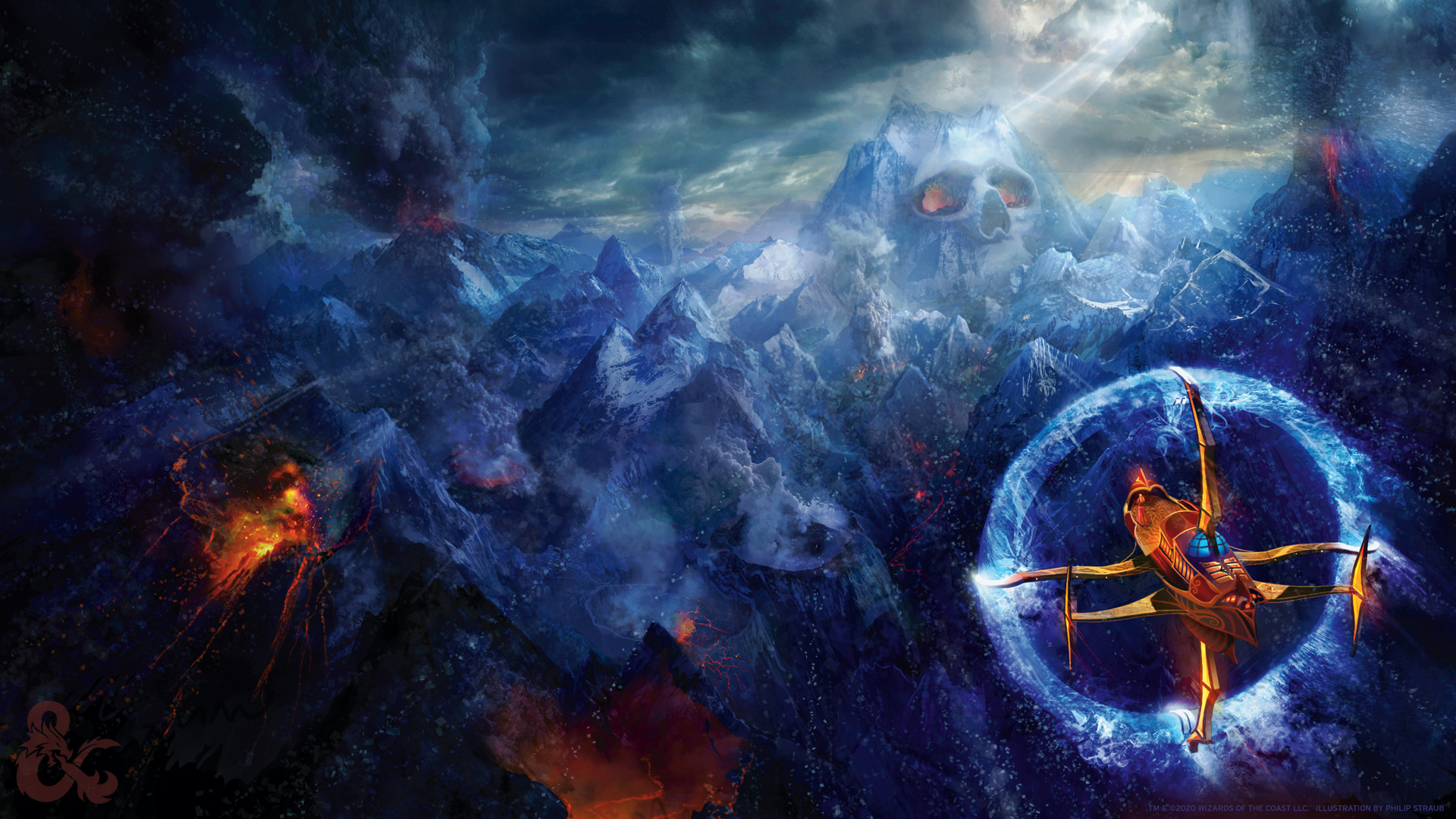
D&D classes: sword, sorcery, or both?
Once you've decided what race your character is, it's time to choose a form. In D&D your grade determines what kind of things you can exercise and ultimately what office you'll play in the group. If you play any kind of online game, it's basically how y'all decide who will exist the tank, the support, the healer, or the DPS (high harm dealer). Some classes use magic, some apply weapons, and some apply a mixture of both.
Equally a new player, it will be easier to understand the mechanics of martial classes and mixed classes (so-called half-casters or third-casters, with express magical capabilities), but that doesn't mean you tin't dive headfirst into some magic-based shenanigans.
Martial Classes
- Barbarian (Tank) A primal fighter that uses their acrimony to fuel powerful attacks and resist damage.
- Fighter (Tank) A trained and practiced warrior with superior techniques and mastery of a range of weapons.
- Monk (DPS) Master of martial arts who can channel their ki to empower their attacks.
- Rogue (DPS) As stealthy as they come, Rogues can sneak up on enemies and pick locks with ease.
Mixed Classes
- Paladin (Tank, Support, Healing) A holy warrior who can channel divine free energy to strengthen their attacks and their friends.
- Ranger (DPS, Back up, Healing) Knows everything about their favored terrain, and can hone their skills on specific enemies.
Magic Classes
- Cleric (Healing, Support) A called acolyte of the Gods with the divine power to heal who packs some seriously powerful magic.
- Bard (Support, DPS) A performer that can channel magic into their words, songs, or music with a wide range of spells.
- Magician (DPS, Support) Born with innate magic that tin be as unpredictable as they are, but really packs a punch.
- Warlock (DPS, Support) Someone who made a pact with a powerful entity in return for powers and a whole host of magical abilities.
- Wizard (DPS, Support) Someone who spends their time reading and researching to learn as much magic every bit they can.
- Druid (Healing, DPS, Tank) At 1 with nature with powerful magic that can both hurt and heal and can transform into different creatures.
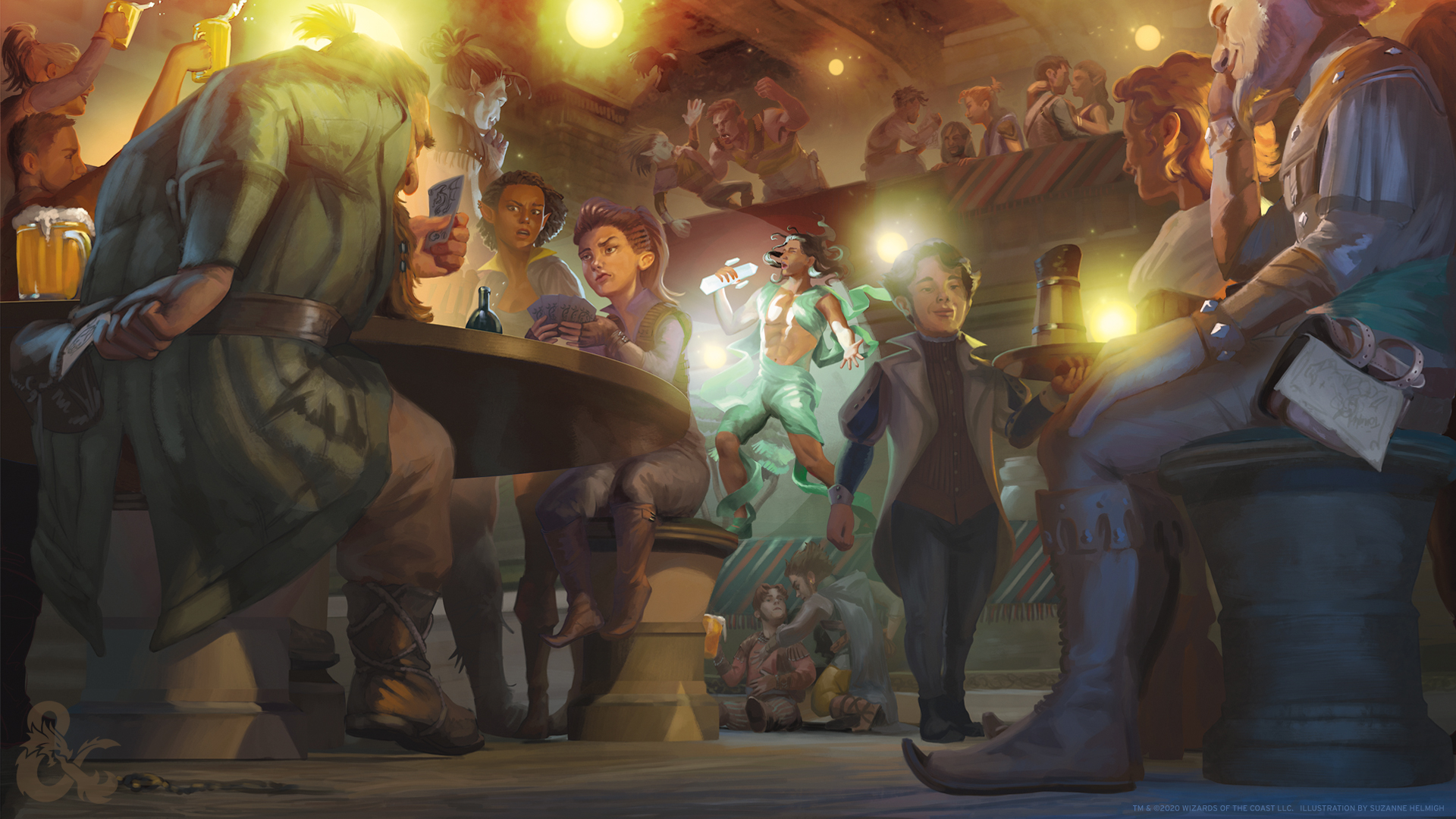
D&D subclasses: how to specialize
Each class also has a number of subclasses that farther customize how your abilities work. For clerics, this will depend on what God you worship (there are a lot to cull from!) and what that God'due south focus is. You could be a Life Cleric who works difficult to heal and inspire those around them, or you lot could be a Tempest Cleric who calls on the power of the storm to smite their enemies.
For Rogues, yous could have trained as an Assassin who is deadly when they get the spring on their enemies, or you could be an Arcane Trickster who has learned to supplement their stealth with magic. Subclass options come up into play at level three for most classes (Clerics, Sorcerer, and Warlocks kick off proper at level 1, and Druids level 2) and then if you're starting at level i, you'll have a fleck of time to play the character and make up one's mind what suits you best.
D&D spells: playing equally a caster
Magic plays a big office in many DND games, and while information technology may seem disruptive at first glance, with the latest 5th edition of the game (5E), the mechanics have been simplified to go far more than beginner-friendly. There are ii types of spells y'all can learn: bones 'cantrips' and more complex levelled spells. Cantrips are spells that you know and so well and are so familiar with that y'all tin can cast them whenever you lot like, as many times as yous like. These tend to be less-powerful simply can be incredibly useful.
Then you have levelled spells. Each spell caster will have a sure number of spell slots they can use for these spells (lots for Wizards, not and so many for Warlocks). When you've used them all, you accept to accept a balance before you tin cast these spells again. The college the spell slot, the more than powerful the spell. These can be a mixture of harm spells like a Fireball thrown into the center of your enemies, a healing spell to bring someone back to full health, or a control spell that can make your enemy retrieve you're actually really cool and it doesn't desire to kill you afterward all.
D&D die: shiny math rocks
Now, you lot may have seen strangely-shaped dice used as part of D&D. Although six-sided dice are the almost mutual outside D&D, the game actually makes use of a whole range of polyhedral dice. You'll frequently see people say "curlicue a d20", 20-sided dice (or d20s) are the most commonly used die in the game. You lot use these more anything else to decide if you tin can hit someone with your sword, if you're able to sneak past the guard, or if you're able to resist the magical charm of that beautiful half-elf bard that's been suspiciously chatting you up.
You lot'll also have the hazard to curl d12s, d10s, d8s, d6s, and d4s on a regular ground.
Of grade, with new technology, you don't actually need to use physical dice. For example, D&D Beyond has a built-in die roller on their graphic symbol sheets. So, you lot just click the spell you want to bandage, or the weapon you want to assail with, and D&D Beyond volition curl the dice for you lot! You tin check out our guide to the best die roller apps too.
D&D 5e: how to get started
And so, y'all know how the game works, you know what race and class you desire to play, and you're ready to dive into the earth of Dungeons and Dragons? Awesome. Trust me, you lot're going to love it! Before you get started, yous'll demand a few things:
- Character Sail
- Thespian's Handbook
- Dice
- Paper and pencil
- Some imagination
You can gear up your character sheet with an online tool like D&D Beyond, and you can as well purchase the books from there also. Or, if you buy a concrete copy of the Role player's Handbook (either from Amazon or your local game shop) there will be a bare character sheet at the dorsum you can utilize. Either fashion, catch a friend who knows the game, or your Dungeon Principal to help you make full it all out, and so y'all're ready to go. Roll those dice, explore new worlds, and get the hero you always imagined!
- Check out the best board games out there too
Source: https://www.techradar.com/news/dnd-5e-races-classes-dice
0 Response to "Dnd 5e Are You Supposed to Know the Save"
Post a Comment